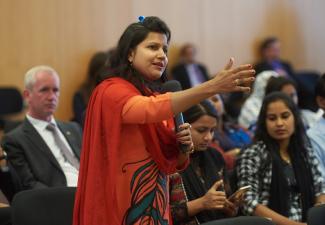Garments production
German experience matters
 BMZ
Participant in the Tripartite Exchange.
BMZ
Participant in the Tripartite Exchange.
In April 2013, Rana Plaza, a factory and commercial building, collapsed in Dhaka, the capital of Bangladesh. About 1,100 people died, and many more were wounded. This was only the worst incident of a long series of accidents. It changed a lot – in Bangladesh as well as in consumer countries such as Germany.
Workers in Rana Plaza made t-shirts, shirts and blouses, some of which were exported to Germany. Consumers all over the world can no longer shut their eyes to the fact that they are directly involved in trade relations that not only result in cheap clothing, but also in labour conditions that are potentially inhumane and even life-threatening. For Bangladesh, Rana Plaza became a tipping point. Political leaders and business managers realised that the country’s garment sector, which had seen years of spectacular growth, had to change in order to secure even a mid-term future. Progress must be made in regard to occupational safety and health, fair wages and environmental impacts.
The BMZ wants to support such change, and it is in a position to do so, both in Germany and production countries like Bangladesh. In the autumn of 2014, Germany’s Development Minister Gerd Müller launched the Partnership for Sustainable Textiles for this purpose. It unites representatives of industry, civil society, trade unions and regulating authorities with the goal of improving social and environmental standards as well as wage levels throughout the entire supply chain.
In Bangladesh, the BMZ has invested about € 16 million since 2010 to contribute to raising social and environmental standards. There is proof of some 800 production sites shoring up their compliance with national and international standards in the past five years. More than 100,000 workers, most of them women, have been made aware of their rights. So far, our efforts have mostly targeted private-sector companies, workers and government agencies at local levels.
Germany has a long history of dialogue of employers and trade unions. Such dialogue has driven industrialisation in a constructive manner. To share such experiences, I have initiated the Tripartite Exchange for Bangladeshi representatives of industry, labour and government. The idea is to facilitate practice-based learning, for instance by allowing a young workers’ representative to observe a German counterpart on the shop floor for a few weeks. I am convinced that such exchange will result in a critical mass for change. By early 2017, we intend to complete the training of 100 young persons from Bangladesh.
In August, the first 24 participants came to Germany on my invitation. The delegation visited Dresden, Köln, Bad Münstereifel and Berlin. The participants had opportunities to deepen their understanding of precautionary measures and occupational safety by sharing ideas with labour leaders and managers in German textile companies. The essential aspect was to put workers’ representatives and labour inspectors in touch with their German counterparts. Seamstresses from Bangladesh thus gained first-hand insights of labour conditions in Germany. The programme is funded by the BMZ, the International Labour Organization (ILO) and Germany’s Statutory Accident Insurance (DGUV).
Tofail Ahmed, the trade minister of the People’s Republic of Bangladesh, and Muhammad Mujibu Haque Chunnu, its labour minister, came to Dresden for the launch of the programme. Ahmed announced that his country will establish a statutory accident insurance for the garment sector, taking into account the experiences made in Germany. In cooperation with the ILO, the BMZ will support this approach right from the start.
It matters that such a system should focus on prevention and rehabilitation in order to reduce the need for financial compensations in the event of accidents. Gilbert Houngbo, deputy director-general of ILO, pointed out that it is up to Bangladesh to decide precisely what kind of system suits the country best.
Hans-Joachim Fuchtel is parliamentary state secretary at Germany’s Federal Ministry for Economic Cooperation and Development (BMZ).
http://www.bmz.de

